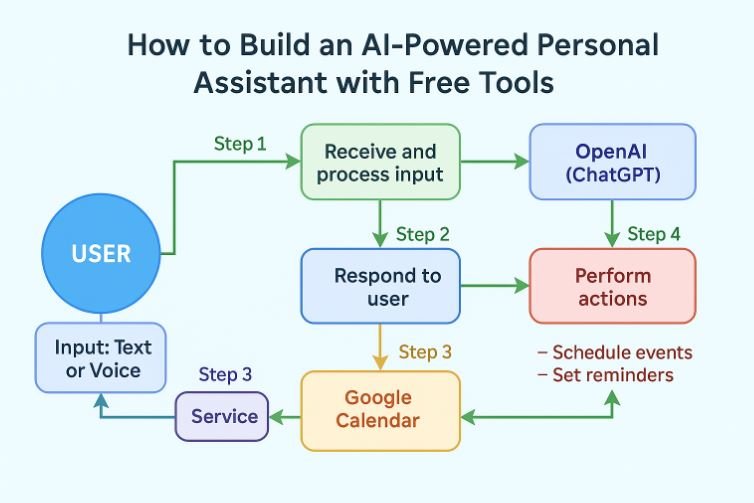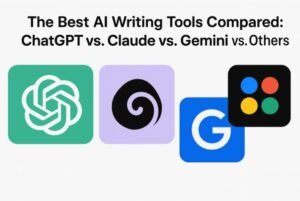The Future of Productivity Is DIY
Ever wished you had a personal assistant to handle your reminders, emails, scheduling, and research?
With today’s AI tools, you don’t need a corporate job or big budget to have one.
This is the ultimate guide on how to build an AI-powered personal assistant with free tools—from task automation to natural conversations, voice commands, and even email summaries.
You’ll walk away with a fully functional AI setup that runs on free platforms, no coding degree required.
Let’s dive in and put AI to work—for you.
What Is an AI-Powered Personal Assistant?
An AI-powered personal assistant is software that can:
Automate tasks (like reminders and email sorting)
- Respond to voice/text commands
- Manage your calendar
- Fetch data (like news, weather, or documents)
- Learn your habits over time
Think of it like Siri or Google Assistant—but custom-built for your exact needs using free tools.
1. Essential Components of Your AI Assistant
| Component | Role | Free Tool Example |
|---|---|---|
| Voice or Text Input | Understand your command | Google Assistant / Telegram Bot |
| NLP (Natural Language Processing) | Interpret meaning | OpenAI / Dialogflow |
| Task Automation | Carry out tasks like reminders, posts | Zapier / Make.com / IFTTT |
| Memory/Data Storage | Store info like notes or to-do lists | Google Sheets / Notion |
| Scheduler | Book meetings, send alerts | Google Calendar + Assistant |
| AI Assistant Core | Manage logic and conversation flow | ChatGPT / GPT-4 / Rasa |
2. Tools You’ll Need to Get Started (Free Version Stack)
| Tool | Purpose | Free Plan Features |
|---|---|---|
| ChatGPT (Free) | AI logic and chat interface | Text-based AI conversations |
| Make.com | Task automation | 1,000 free operations/month |
| Google Calendar | Scheduling | Sync + notifications |
| Notion / Google Sheets | Memory and long-term data | Cloud-based, cross-platform |
| Telegram | Voice/Text input (Bot API) | Free bots, secure platform |
| Whisper API / Google Speech-to-Text | Convert voice to text | Free tier or built-in speech APIs |
3. Step-by-Step: How to Build Your AI Assistant (No Coding Needed)
Step 1: Define What You Want Your Assistant to Do
Ask yourself:
- Do I want voice commands or just text?
- Do I need it to schedule things?
- Should it remember past instructions?
- Should it talk back with personality?
Example Goal: “I want an AI that I can text on Telegram to remind me of tasks, fetch emails, summarize news, and schedule meetings.”
Step 2: Set Up the Communication Channel (Telegram Bot)
- Create a Telegram account
- Search for BotFather and create your bot
- Save the Bot Token
- Use Make.com to connect Telegram Bot to actions (e.g., trigger GPT responses or schedule reminders)
Step 3: Add AI Brain Using ChatGPT
- Create a free OpenAI account
- Use Make.com or Zapier to connect:
- Telegram input → OpenAI (ChatGPT) → Response to Telegram
Add instructions like:
“You are my personal assistant. When I say ‘Schedule’, prompt me for date/time and send it to Google Calendar.”
Use pre-set prompts or memory in ChatGPT to simulate contextual conversation.
Step 4: Connect to Google Calendar and Sheets
Use Make.com or Zapier:
- Trigger: ChatGPT command “Add meeting”
- Action: Schedule event in Google Calendar
- Optional: Log meeting details to Google Sheets for archive
Step 5: Add Speech-to-Text for Voice Commands (Optional)
Use:
Whisper by OpenAI (via Make.com webhook)
Google Speech-to-Text API (free tier)
Convert voice → text → send to ChatGPT → respond with text or voice
Real-World Use Cases (Based on Experience)
| Use Case | Tools Used | Free-Friendly? |
|---|---|---|
| Daily Summary at 8 AM | Make.com + OpenAI + Google Sheets | ✅ |
| “Remind me to call Dad at 5 PM” | Telegram + ChatGPT + Google Calendar | ✅ |
| Voice Notes → To-Do List | Whisper + ChatGPT + Notion | ✅ |
| Email Summaries | Gmail API + OpenAI | ✅ (basic) |
| AI Concierge (e.g., “Book Uber”) | ChatGPT + custom API triggers | ⚠️ Limited |
“I built a Telegram assistant that reminds me of deadlines and sends weekly progress reports. Took less than a weekend to set up.”
– Jason Y., indie app builder
Expert Tips for Better Performance
- Be clear with prompts: The more specific your request, the better the AI works.
- Use memory wisely: Store notes or context in Google Sheets/Notion.
- Secure your API keys: Never expose them in public scripts.
- Automate boring stuff first: Start small—reminders, weather, calendar.
- Use routines: Like “Morning Check-in” or “End-of-Day Recap” as daily triggers.
Table: Free vs Paid AI Assistant Building Tools
| Feature | Free Tools Setup | Premium Platforms (e.g., Replika, x.ai) |
|---|---|---|
| Custom Workflows | ✅ (Make.com, Zapier) | ❌ (Prebuilt only) |
| Voice Support | ✅ (Whisper, Telegram) | ✅ |
| Natural Conversations | ✅ (ChatGPT) | ✅ |
| Memory + Personalization | ✅ (Sheets, Notion) | ✅ (limited customization) |
| Cost | Free or minimal | $10–30/month |
Optional Add-Ons to Level Up Your Assistant
- TTS (Text-to-Speech): Respond with voice using Google TTS
- Auto-respond to Emails: Set filters via Gmail + Make
- Habit Tracking: Log daily check-ins in Notion or Sheets
- Sentiment Detection: Use GPT prompts to track mood via journal entries
Visual Suggestions for Blog
- Infographic: “AI Assistant Workflow Overview”
- Screenshot: ChatGPT responding via Telegram
- Step-by-step flowchart: From user input to task execution
- Table of free AI tool features
- Illustrated use case: “Voice Note → Task Reminder → Calendar Entry”
AI Should Work for You, Not the Other Way Around
Building your own AI assistant doesn’t require a CS degree or a big budget. With just a few free tools and a bit of creativity, you can automate your day, simplify your routine, and make space for what really matters.
This guide on how to build an AI-powered personal assistant with free tools empowers you to bring futuristic productivity into your everyday life—on your terms.
Want help setting up your first AI assistant? Drop your use case in the comments
Subscribe for weekly no-code automation tutorials
Bookmark this post—your personal AI assistant journey starts today!




